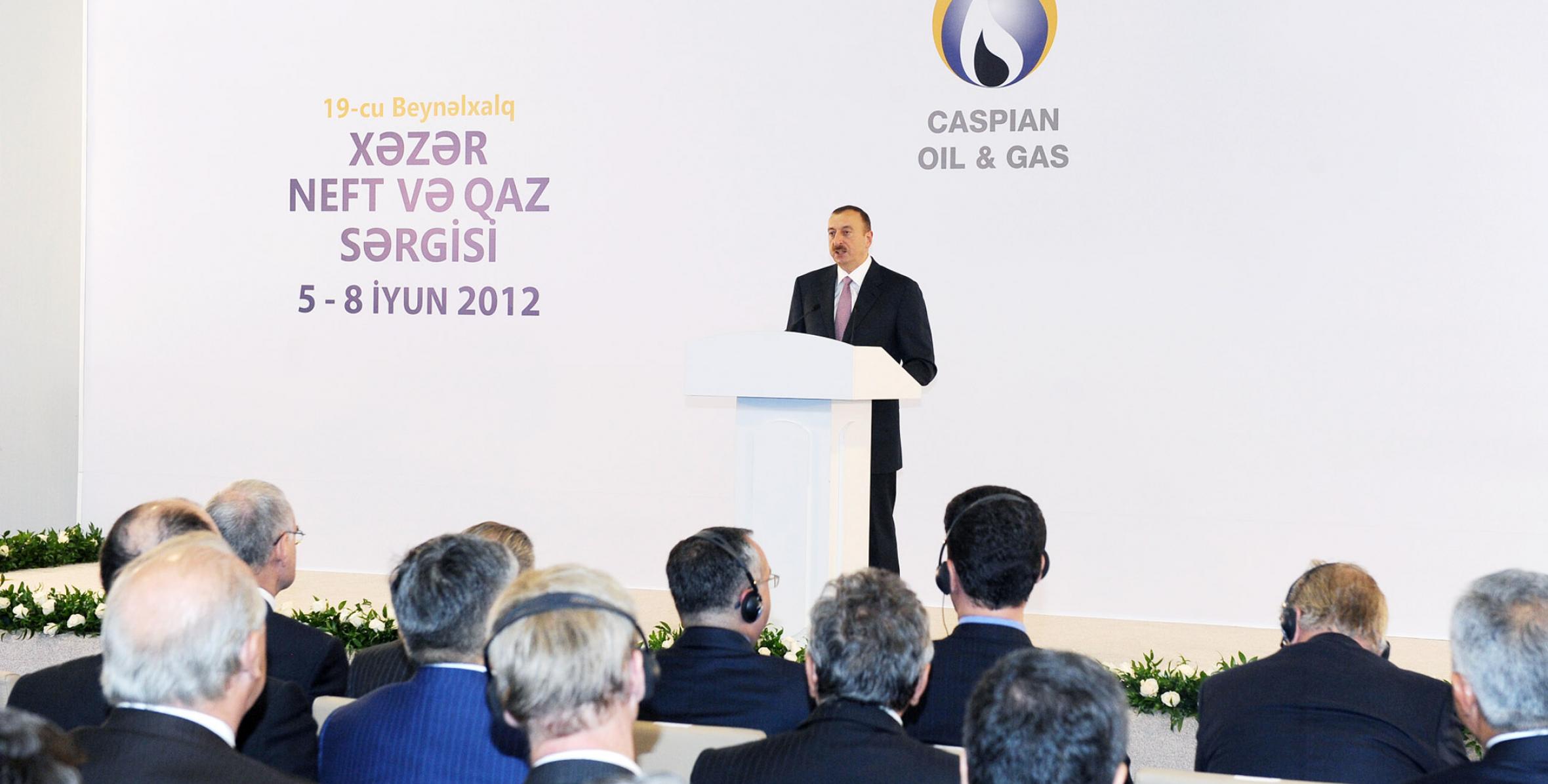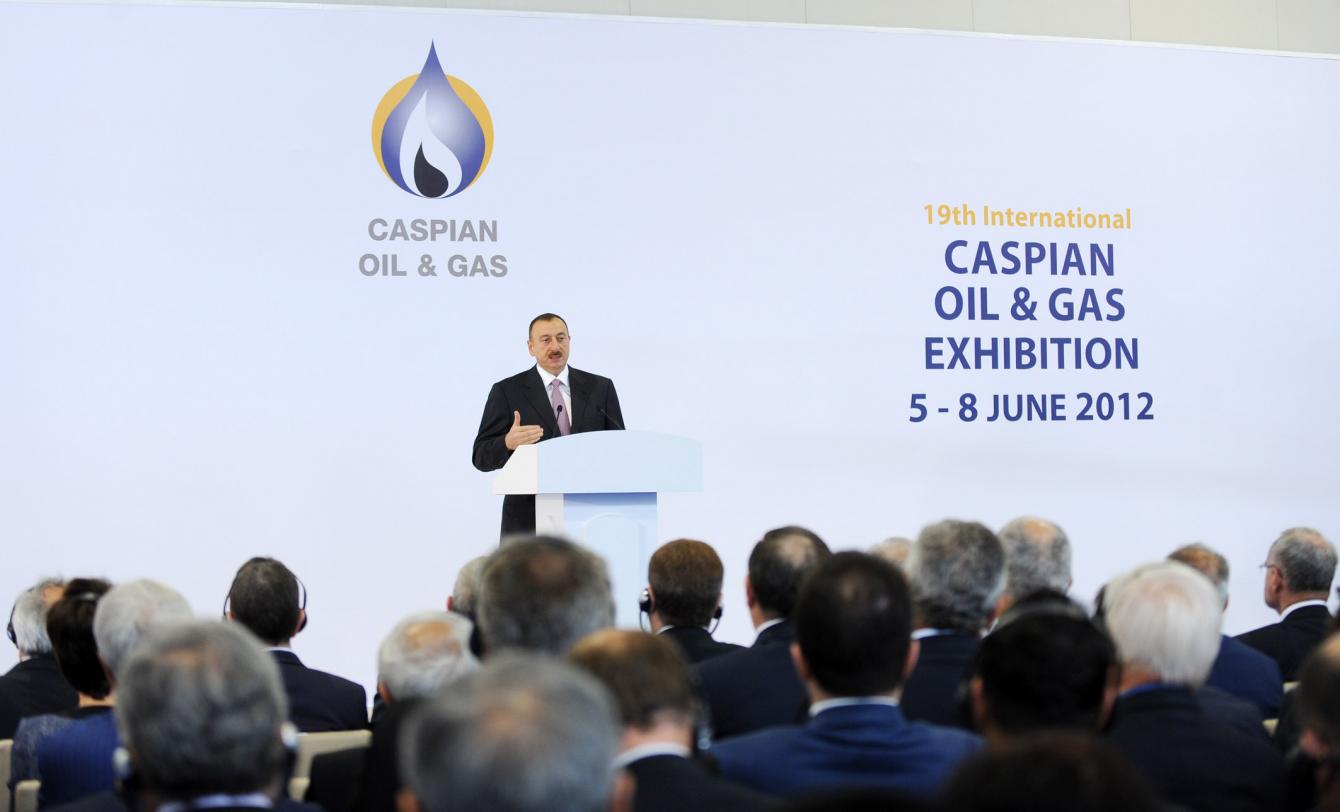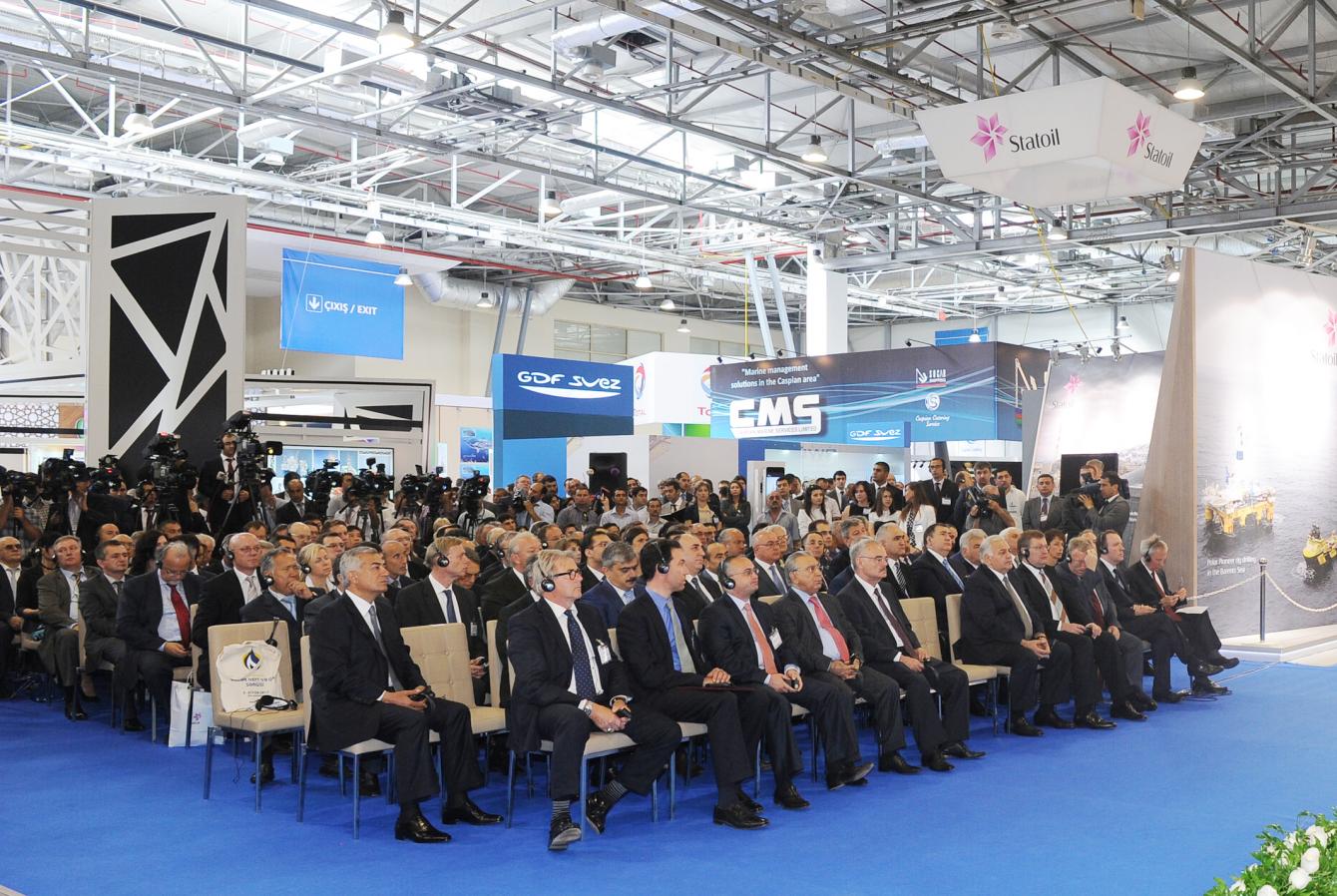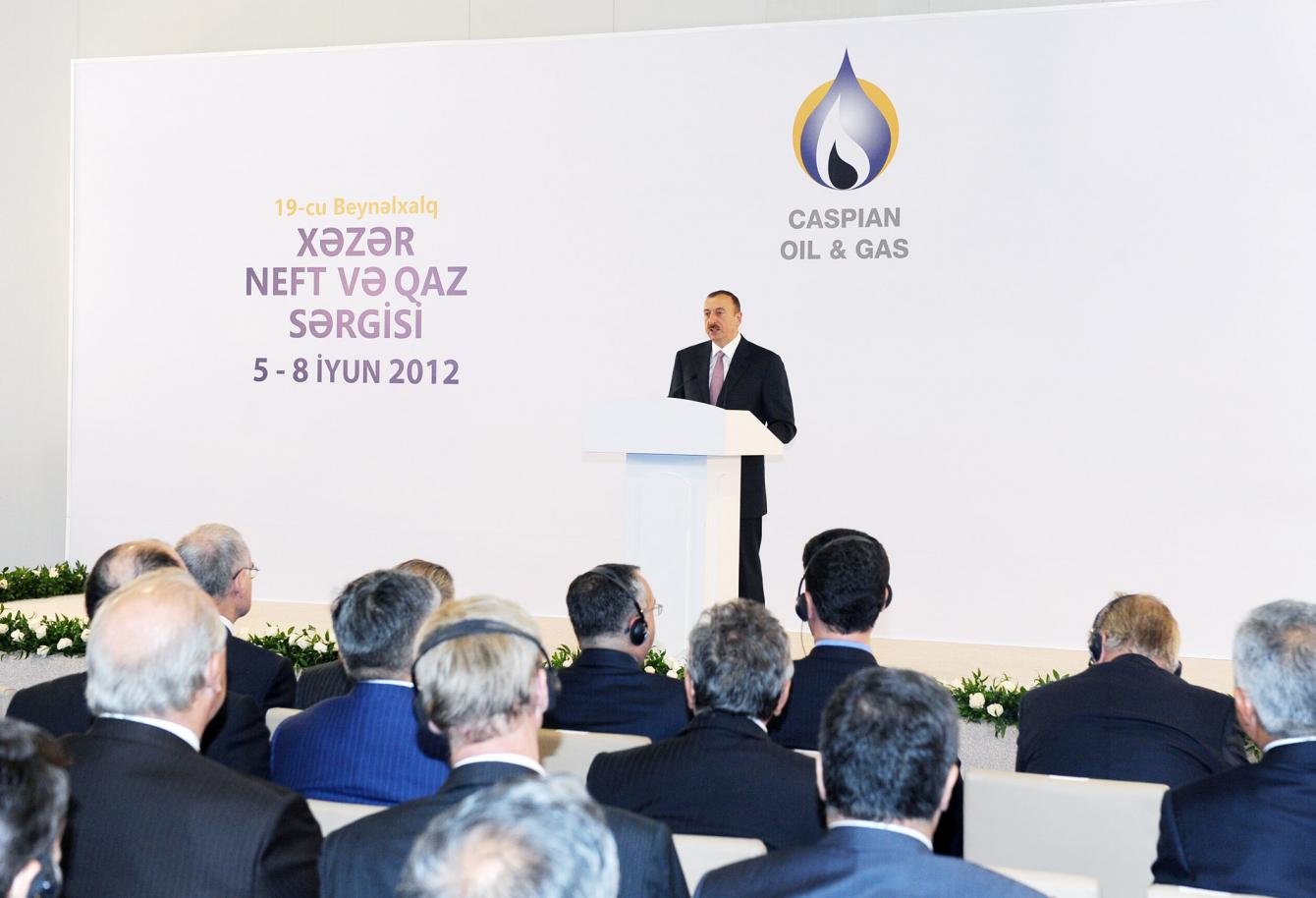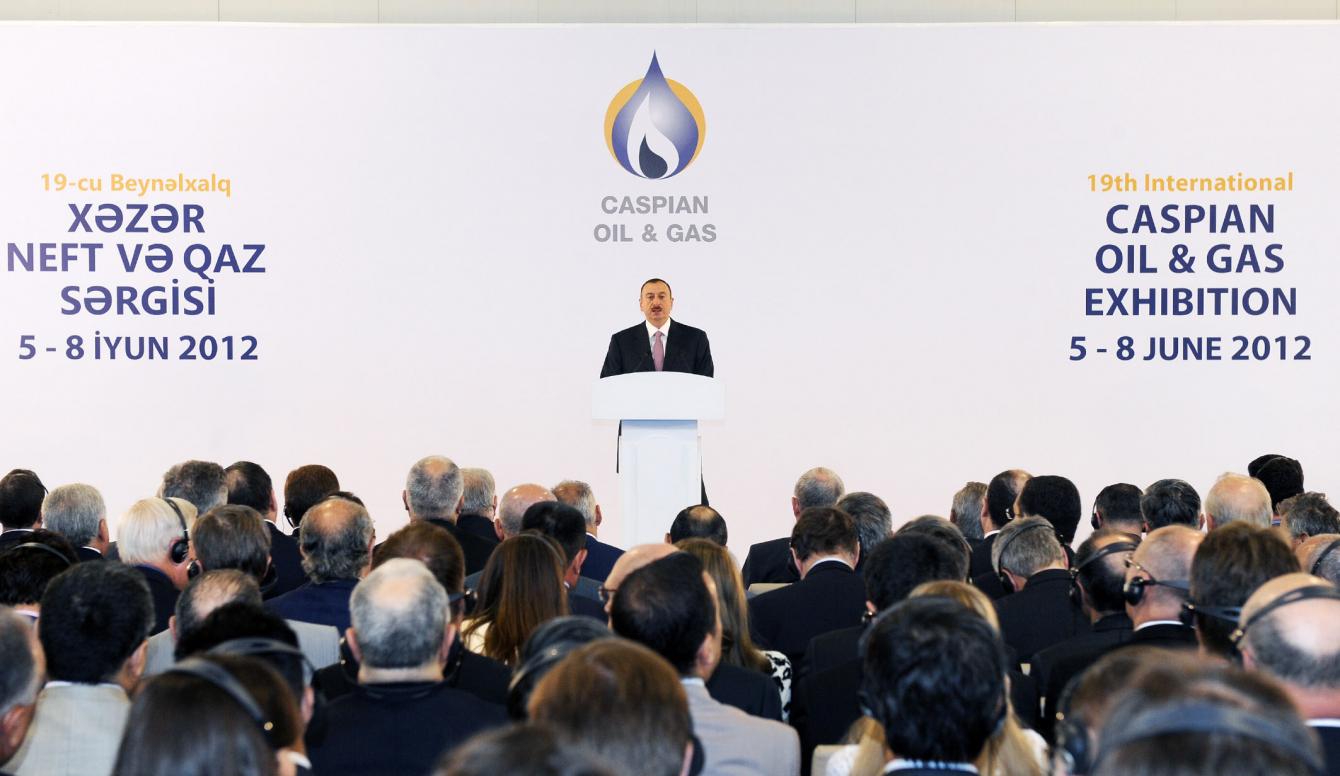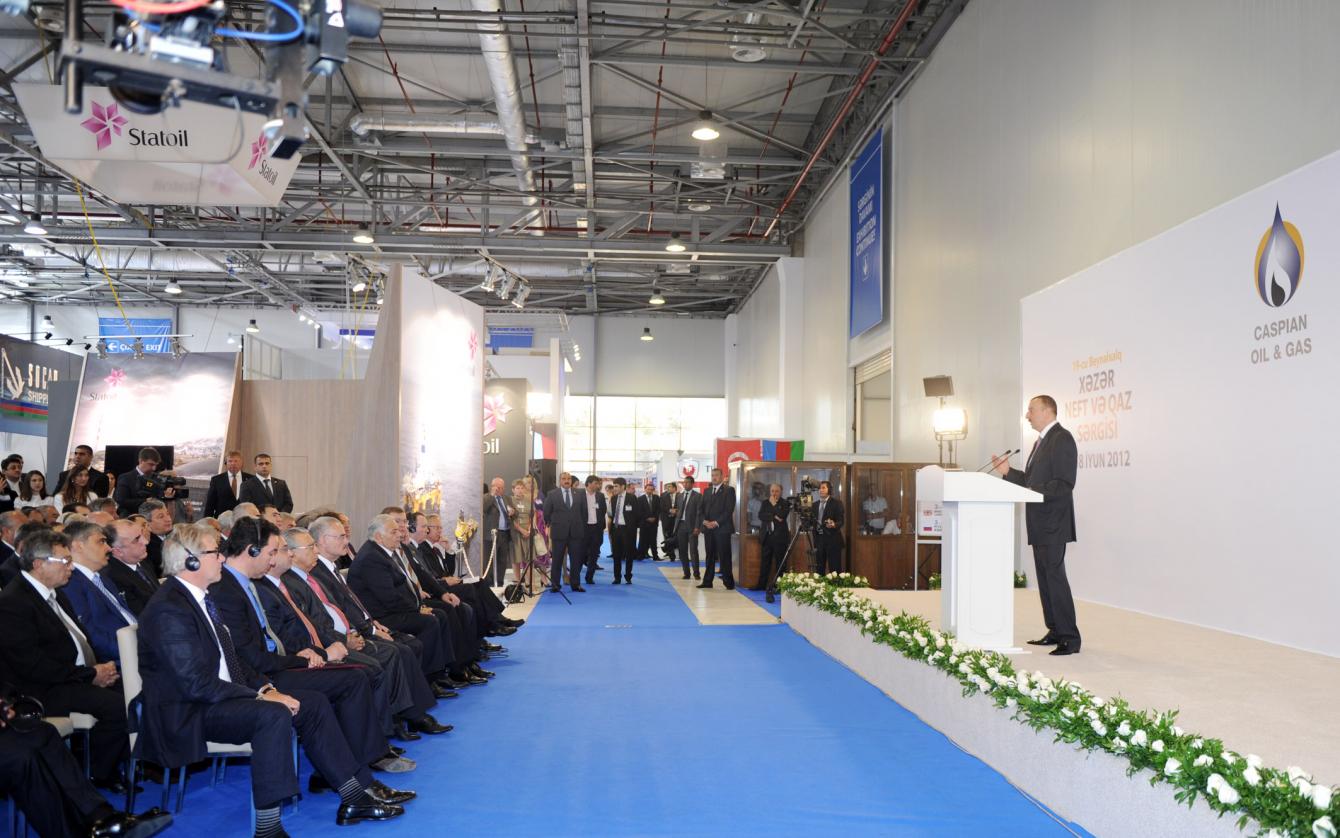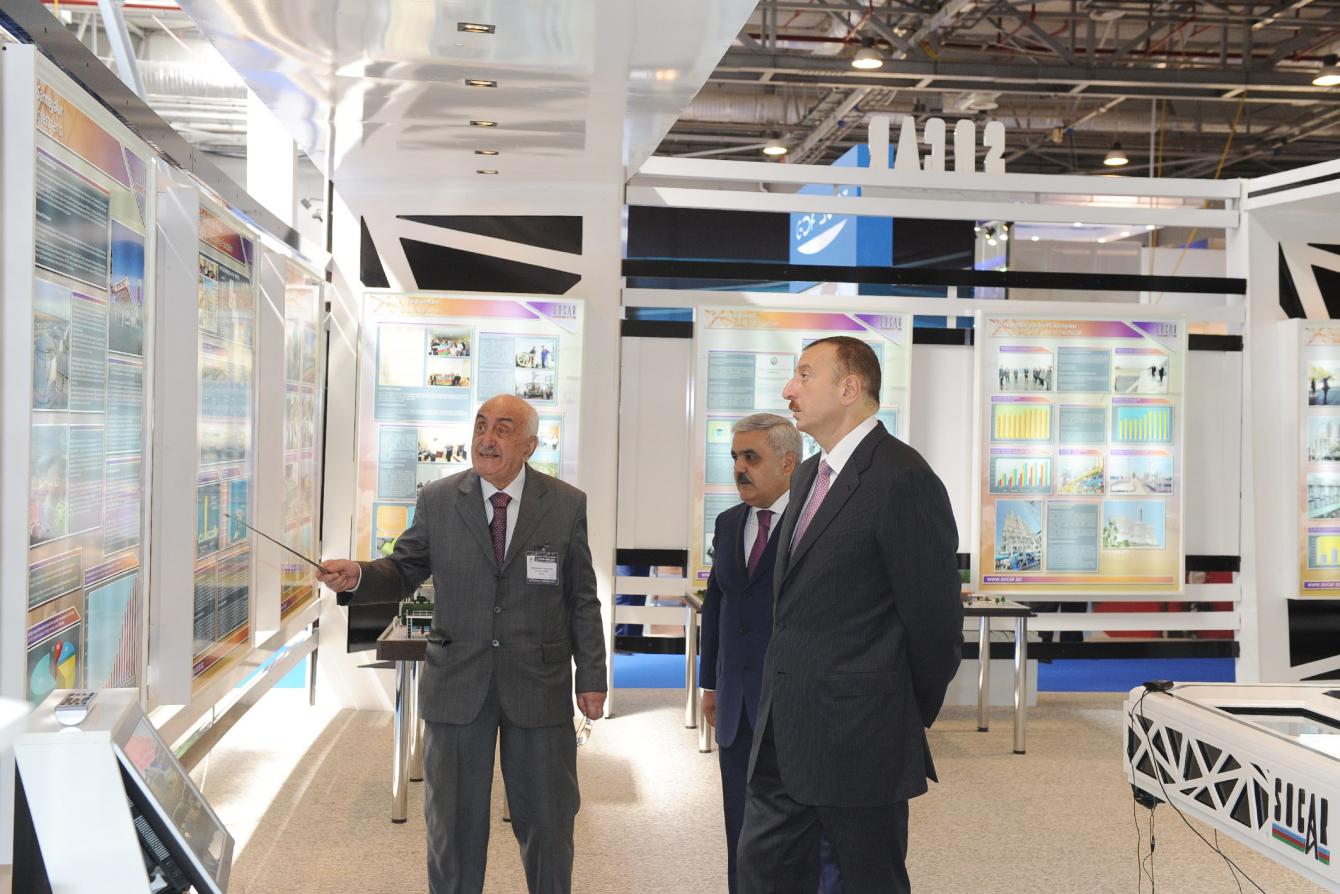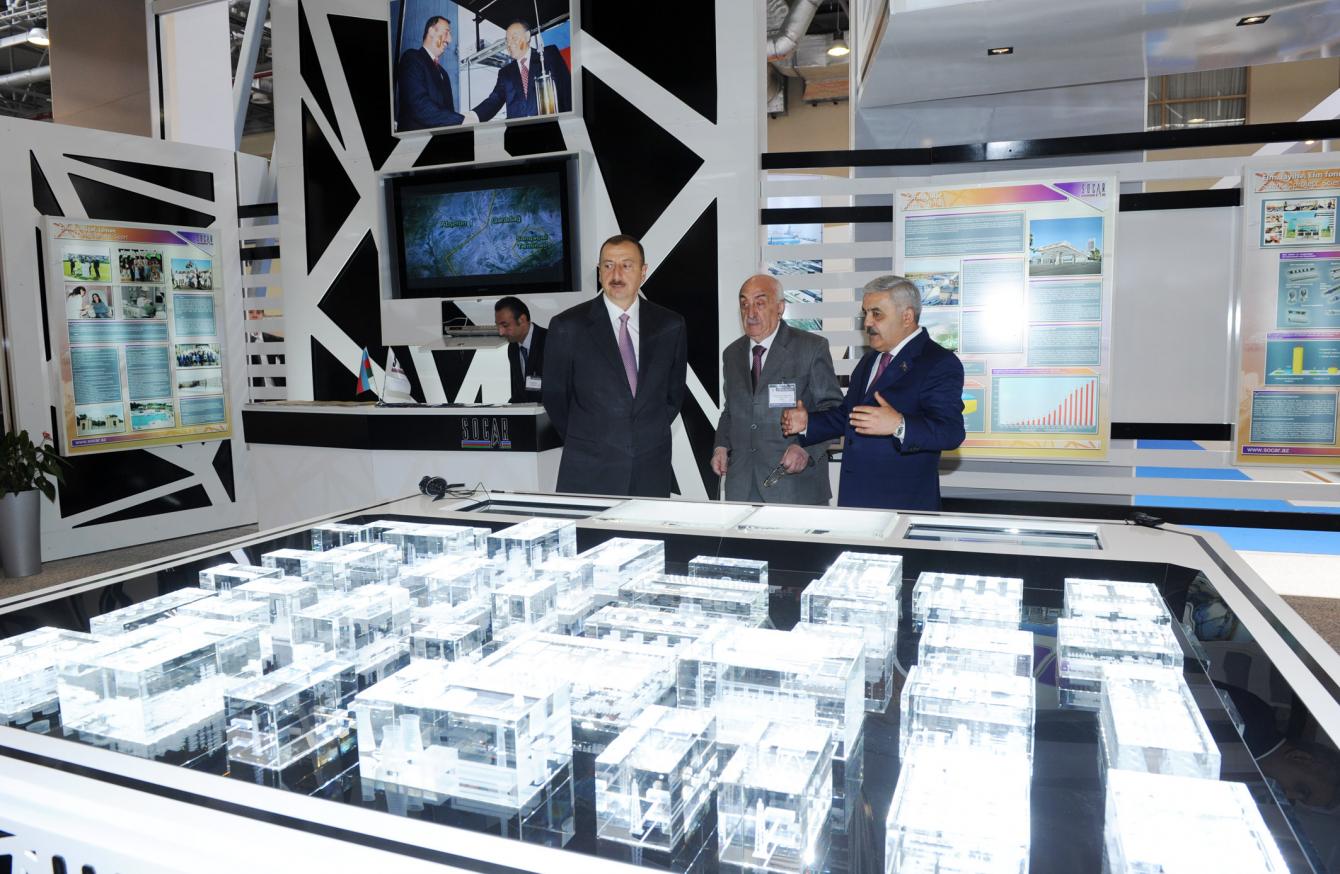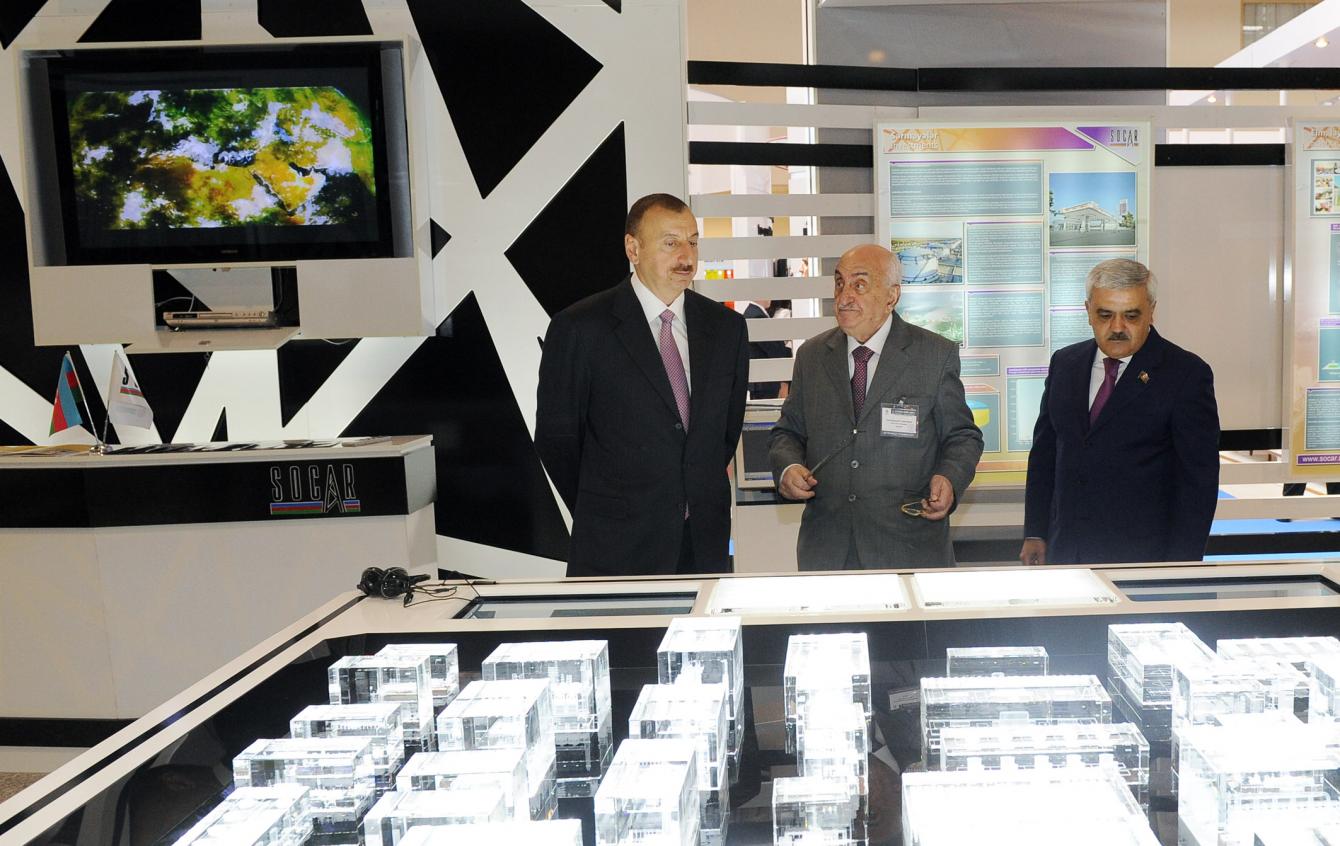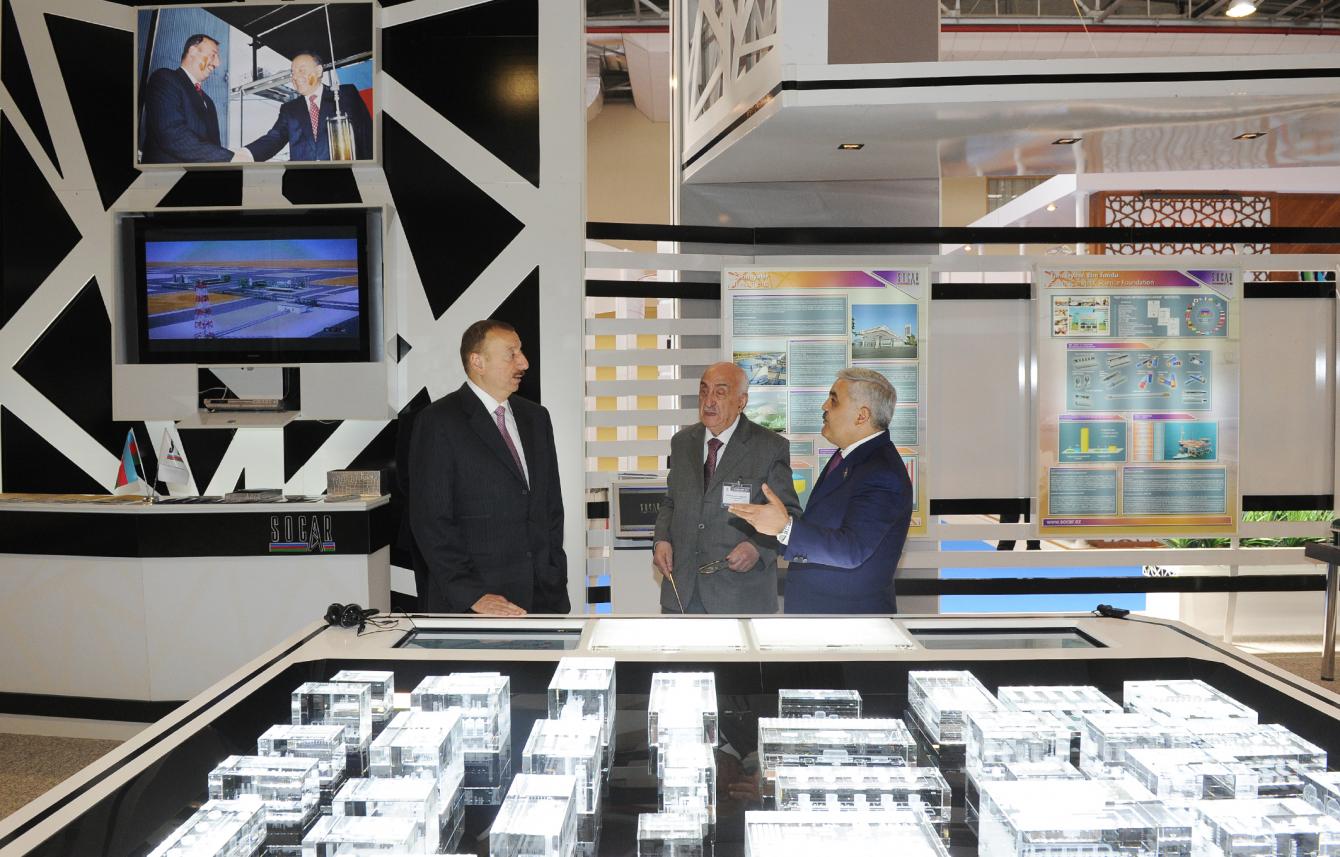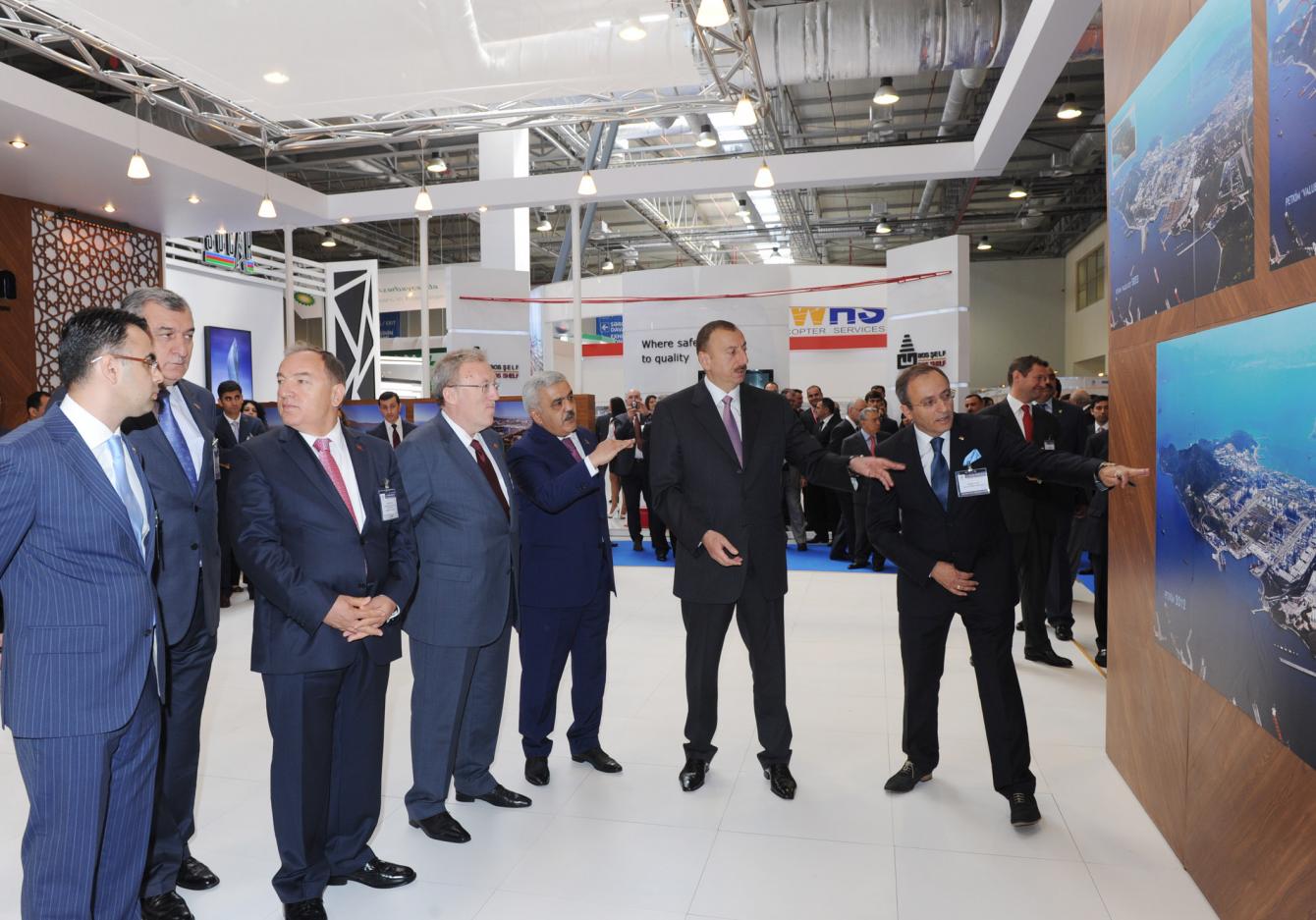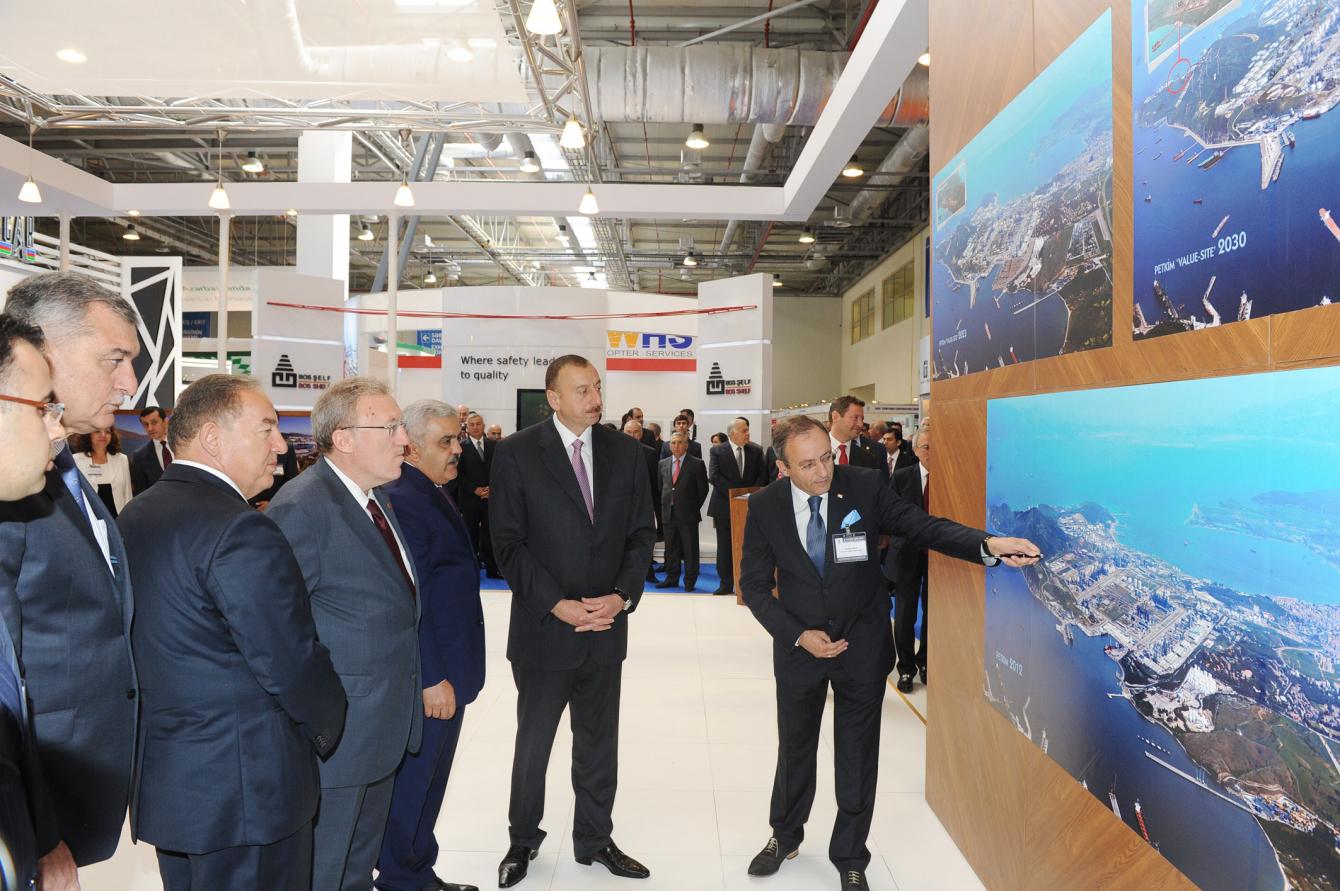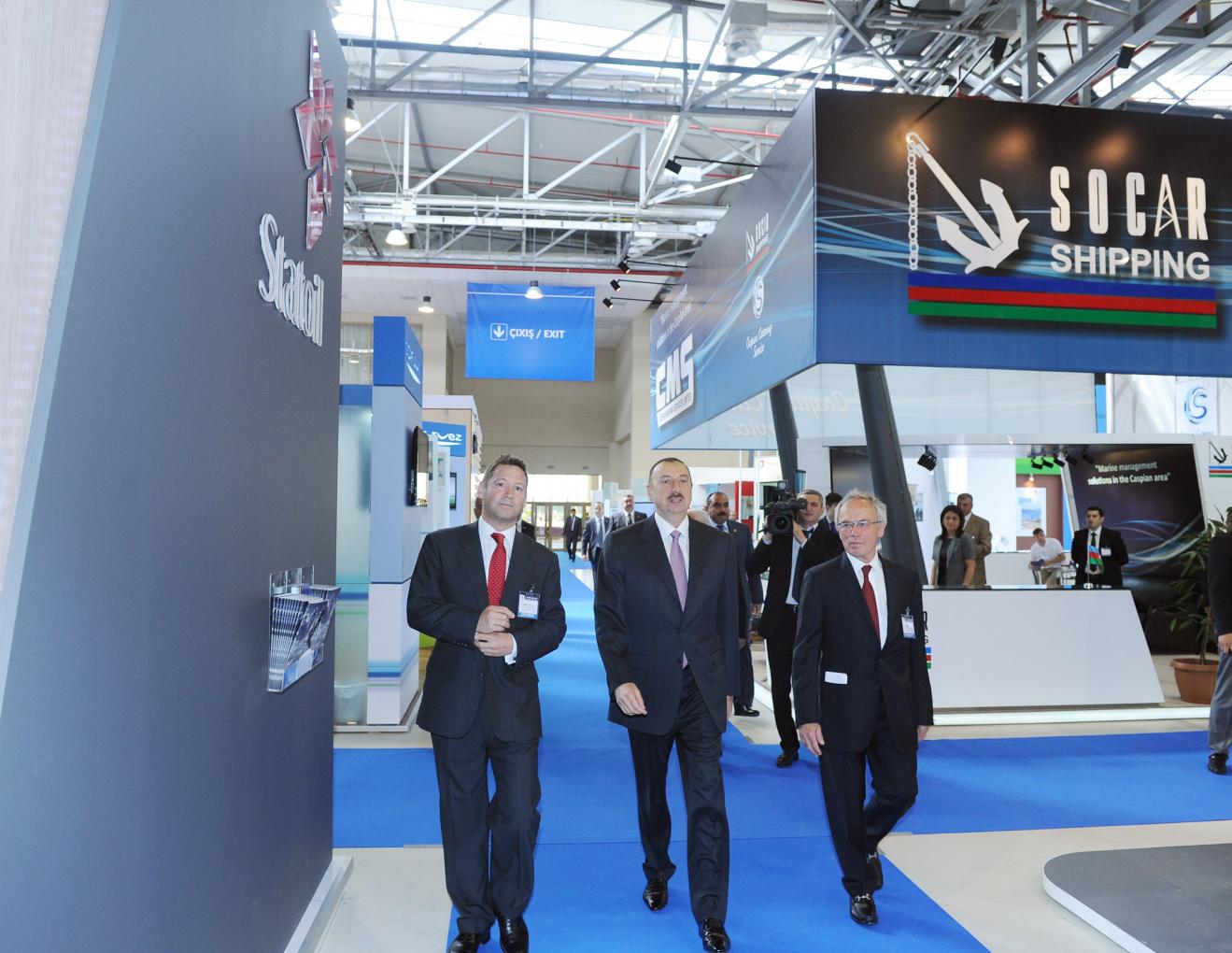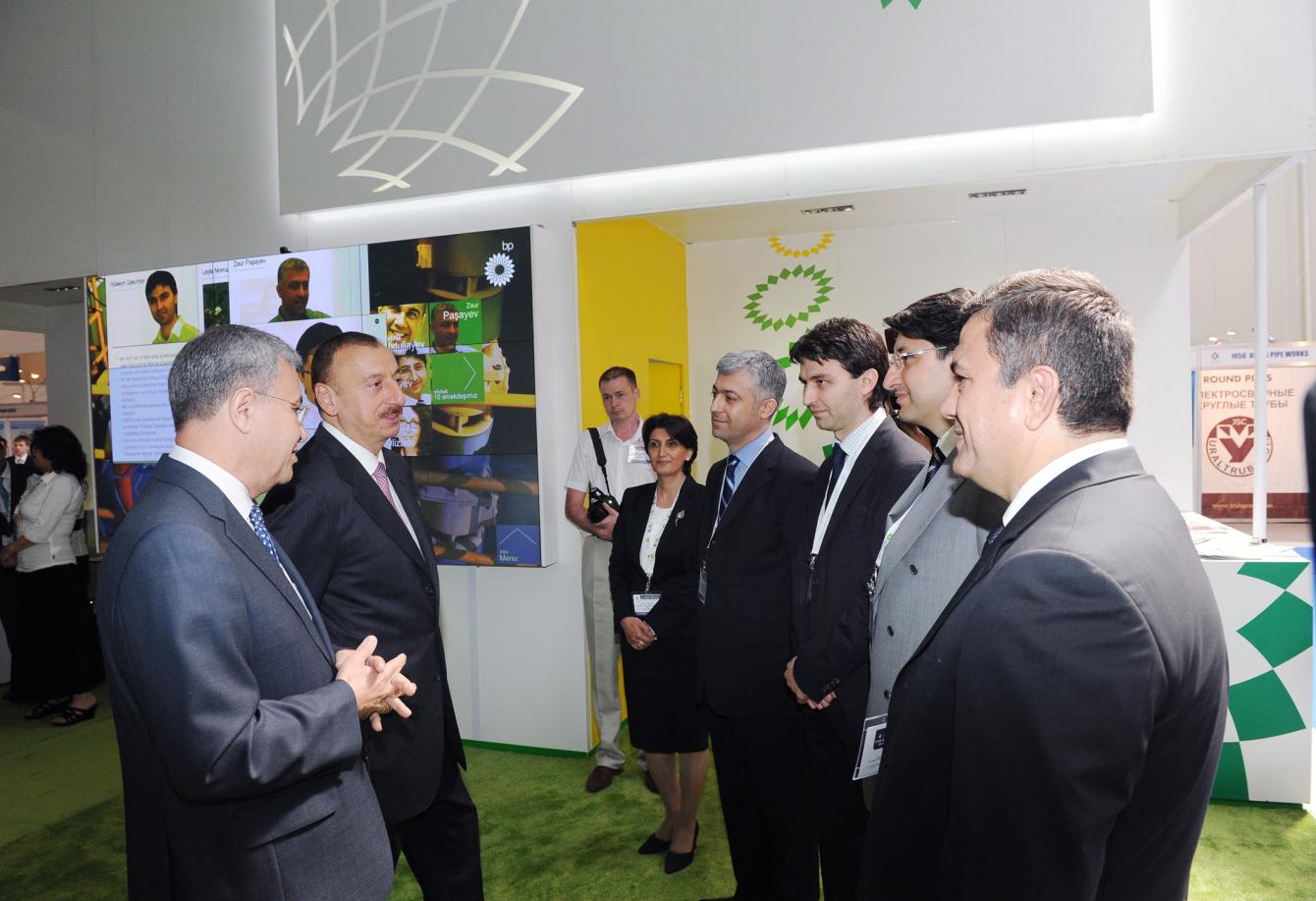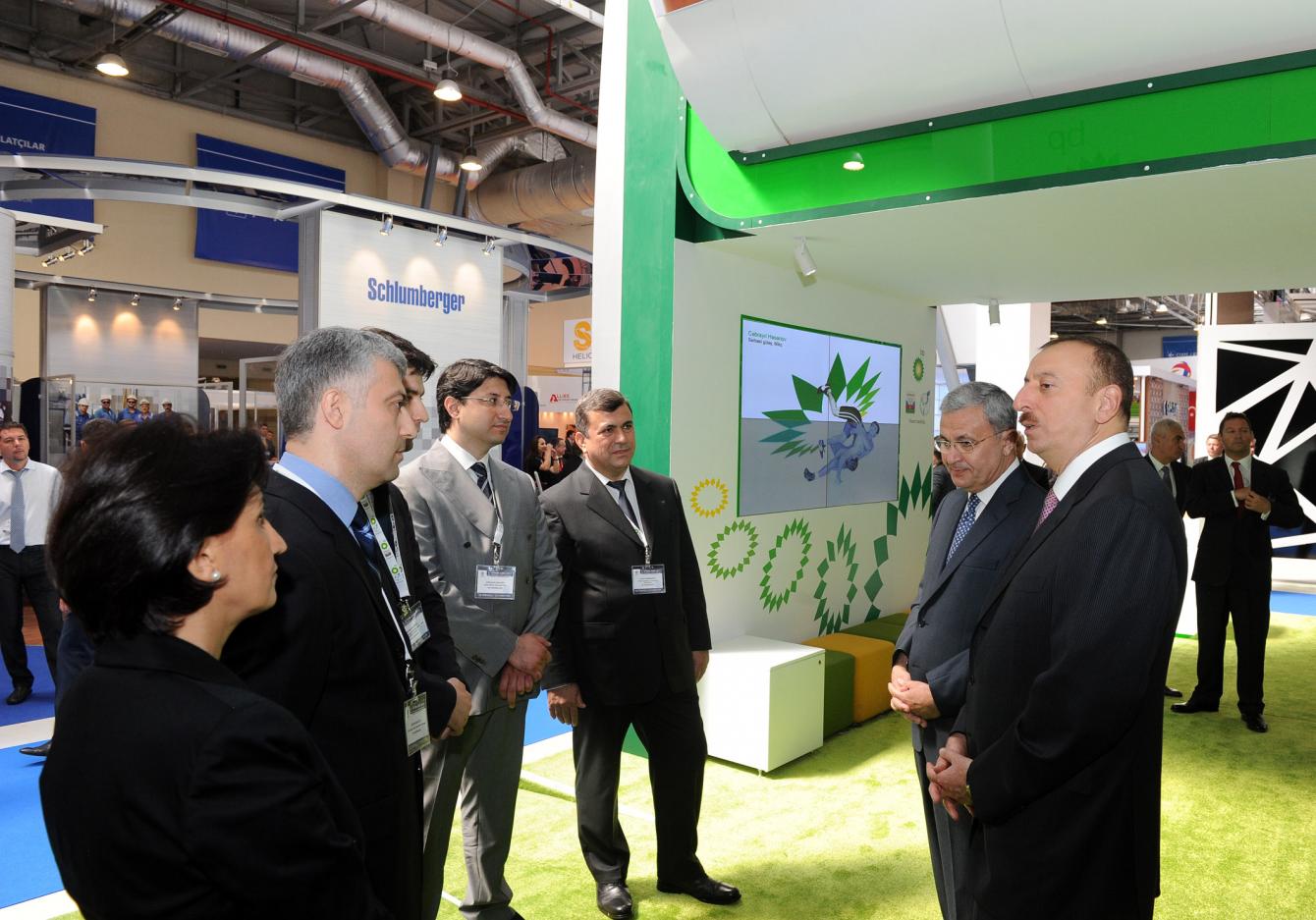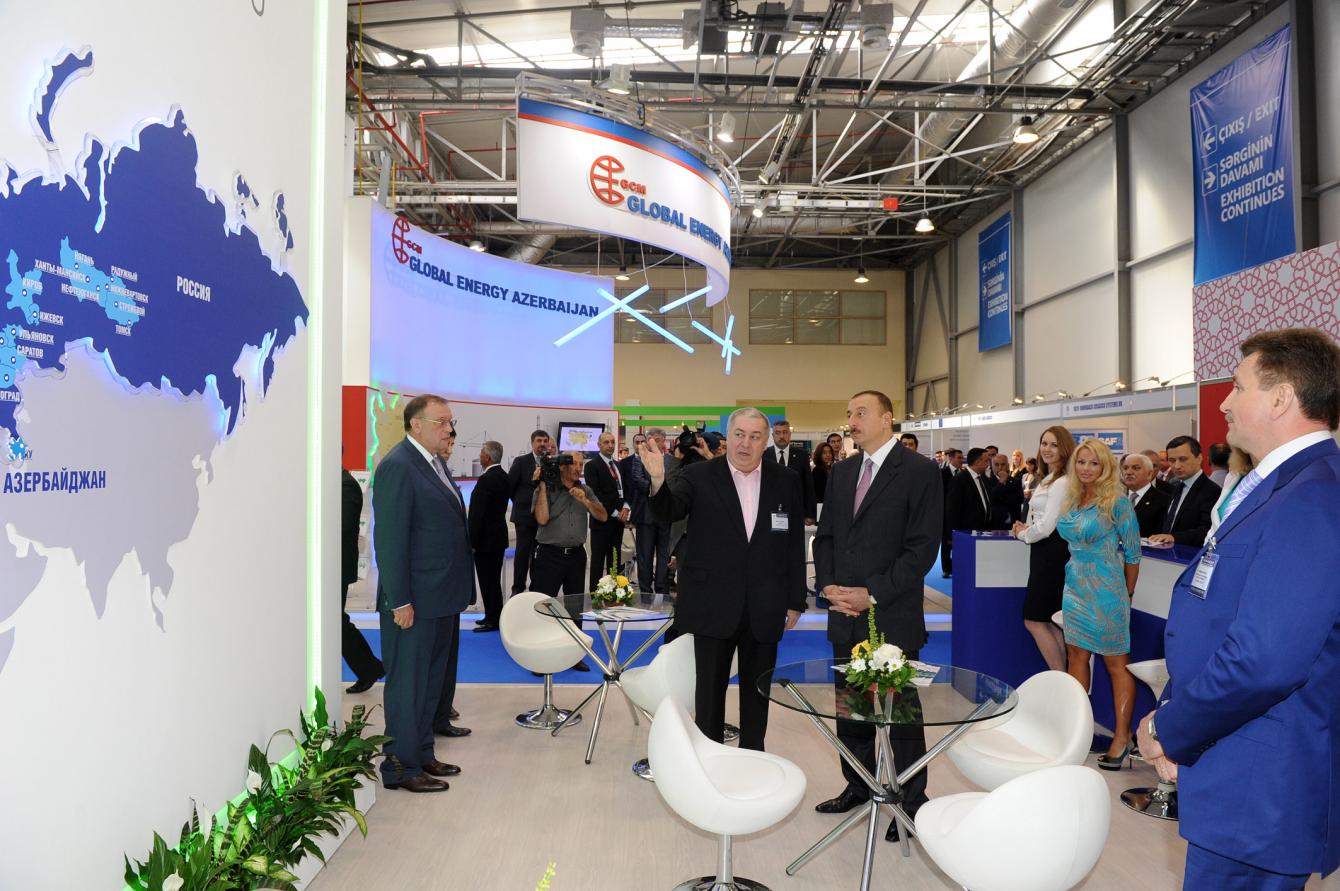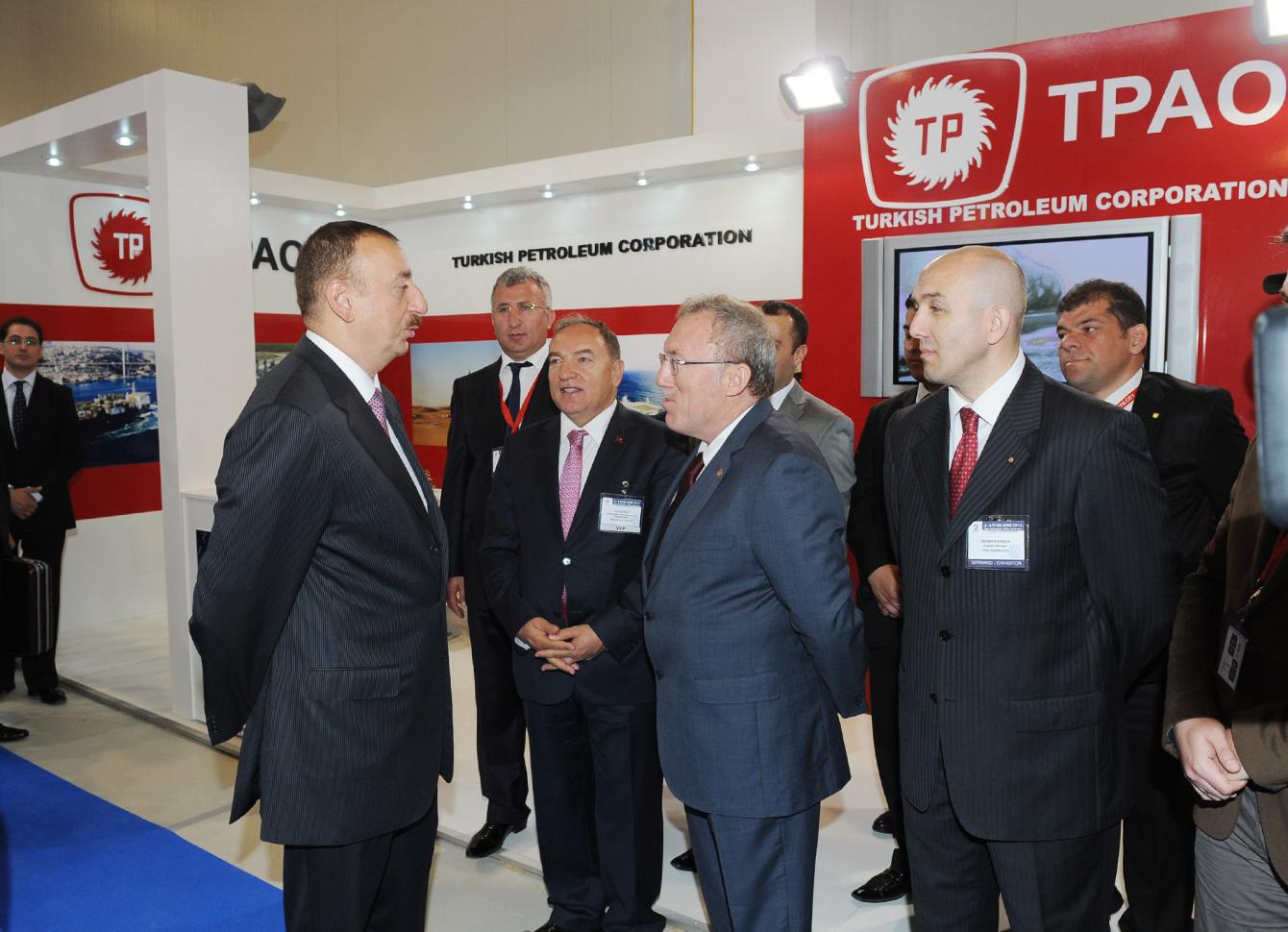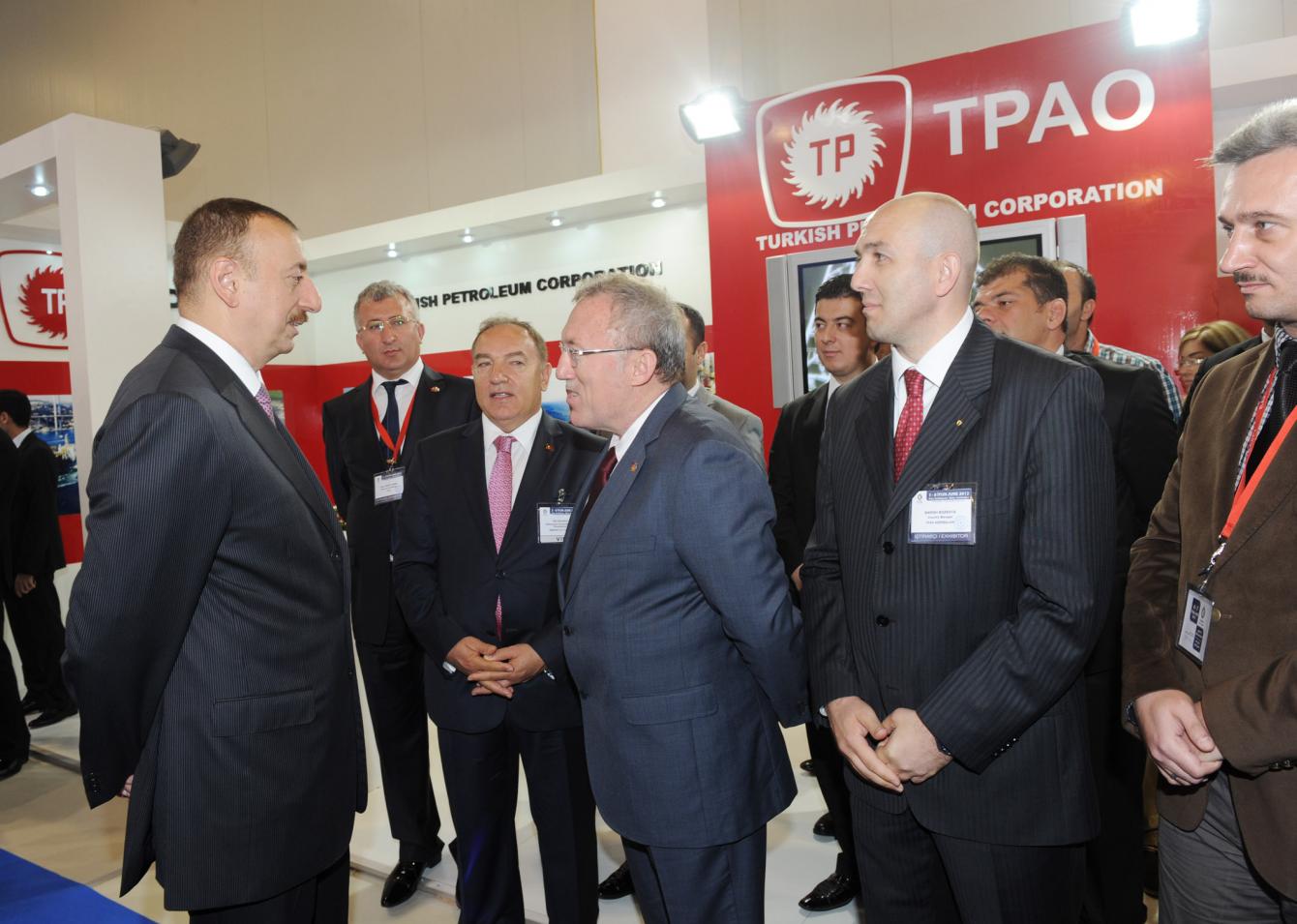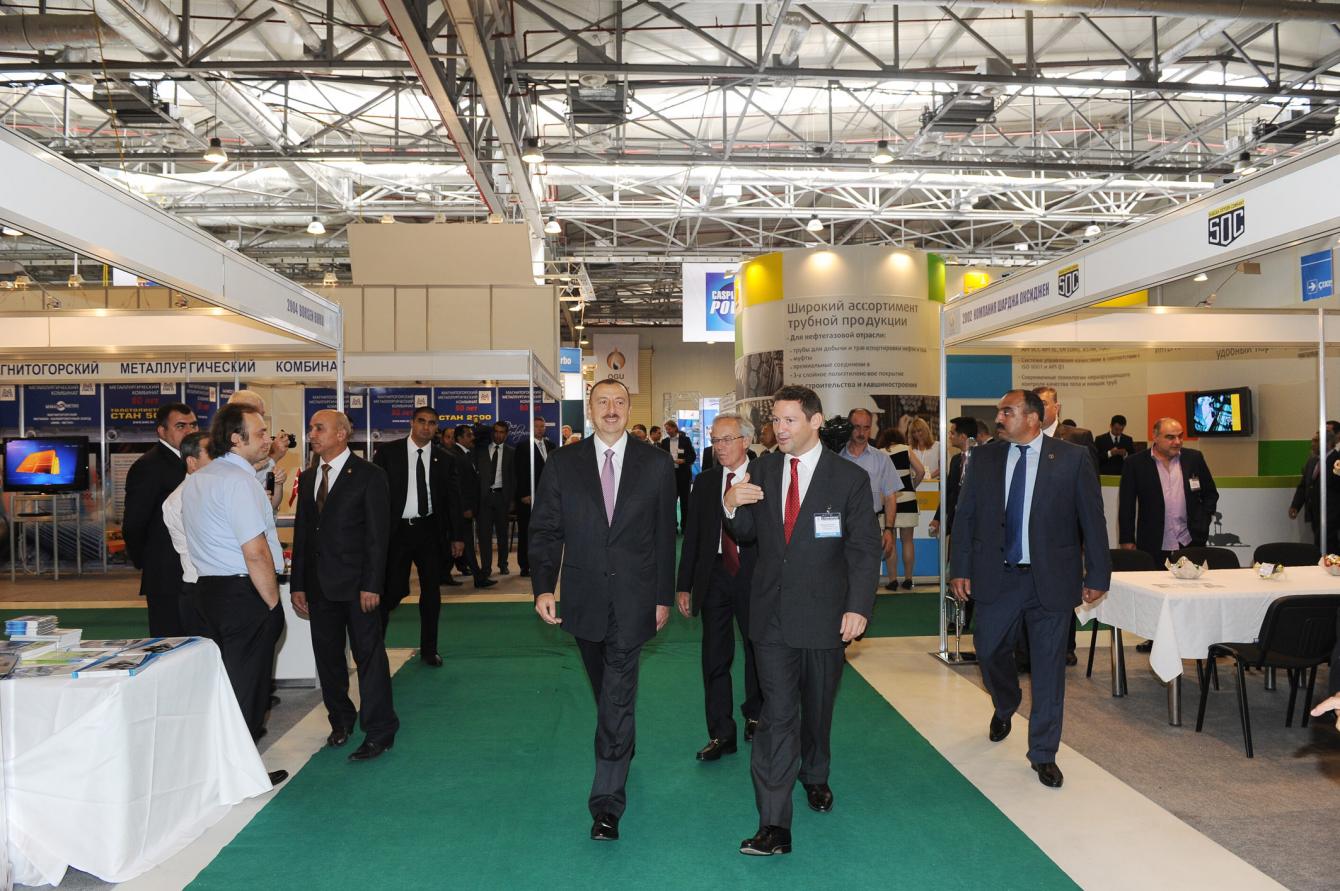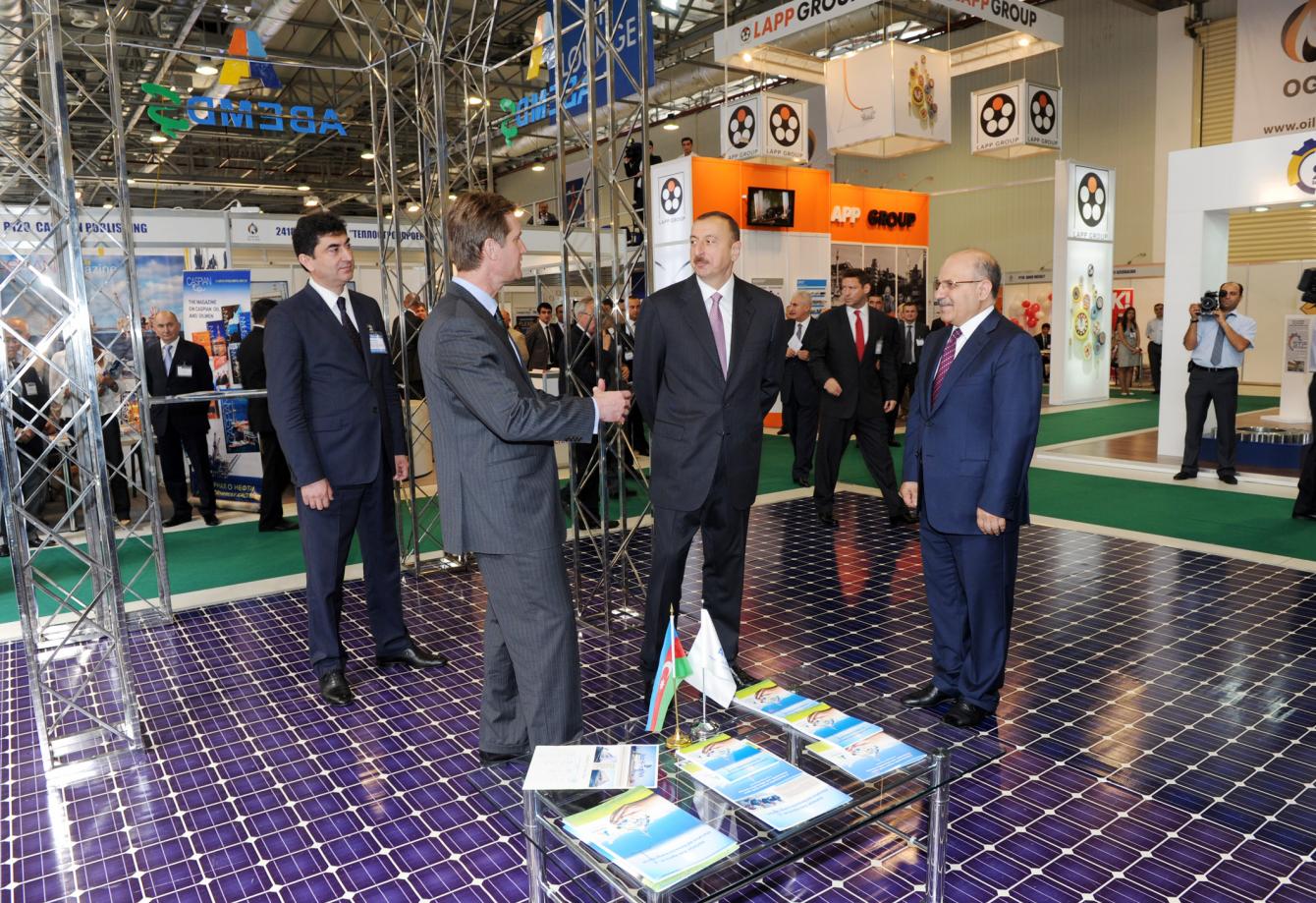- Dear ladies and gentlemen!
Dear friends!
I sincerely salute all of you.
The exhibition and conference “Caspian Oil & Gas: Refining and Petrochemicals” are a great event for our country. The exhibition and the conference already have a long history. They take place for the 19th time. I can say that the interest in the show is not declining, but growing. As a result, this time the exhibition has been joined by more than 300 companies.
On my way here I remembered the first exhibition. It was organized in 1994. The first exhibition played a huge role not only in the oil and gas industry but also in the overall development of Azerbaijan. Since Azerbaijan was still a newly-independent state, it could not present itself to the world properly. Of course, specialists were aware of Azerbaijan’s abundant oil fields but the broader business community was unaware. It was the 1994 exhibition that introduced Azerbaijan’s possibilities, in particular the oil sector, to the world. Azerbaijan started attracting great interest. It is no coincidence that the “Contract of the Century” was signed a few months after the exhibition. We are seeing its results today.
At that time our country was only defining the directions of its future development. How will Azerbaijan develop, what kind of a country will it be? Of course, our key asset, the oil, was expected to serve the overall development of the country. But for that to happen foreign partners were to invest in Azerbaijan because the country's own material resources were very limited. We managed to achieve this. In a short time various large-scale companies came to Azerbaijan and started to invest in it. This signaled the start of Azerbaijan’s successful development.
It was in 1994 that great leader Heydar Aliyev declared the oil strategy that is still ongoing. Of course, over the 19 years this strategy has grown to encompass new directions.
Thus, Azerbaijan’s energy resources fully serve the interests of the Azerbaijani people today.
In 1994, we were at the start of a long journey. I am very pleased that all the tasks set at the time have been met. Major investment has been made in Azerbaijan. At present, the investment made in the oil and gas sector totals almost $50 billion. Overall, approximately $120 billion has been invested in the national economy since 1995. So we have used the oil factor very skillfully and efficiently. We have channeled our oil revenues into the development of the non-oil sector. We have created a diversified economy. Today this process is ongoing. In the mid-1990s, drastic reforms were launched both in the oil industry and in the economy as a whole. At the time, Azerbaijan was not as strong as it is now from geopolitical, economic and political standpoints. Azerbaijan was subjected to pressure and threats. We were a young republic. Our material capabilities were very limited. But despite this, thanks to the determination and courage of Heydar Aliyev and his judicious strategy, we have achieved all our goals.
In 2003, the foundation was laid for the Baku-Tbilisi-Ceyhan oil pipeline, while in 2006 it was commissioned. This pipeline has radically changed the energy map of the region, perhaps even the entire continent. It has been a historic step forward not only for the supply of Azerbaijani oil to world markets but also for the opening of a new corridor.
Afterwards, when this corridor became operational, the Baku-Tbilisi-Erzurum gas pipeline was built to supply natural gas from the Shah Deniz field to world markets.
The Shah Deniz contract was signed two years after the contract on Azeri-Chirag-Guneshli. At the time, the world had no information about Azerbaijan’s gas potential because it was not studied in Soviet years. Of course, our geologists and experts knew that we have ample reserves of gas but Azerbaijan had never attracted foreign investors as a gas country.
But after the discovery of Shah Deniz, one of the world’s biggest gas fields, attention to this area certainly increased.
Thus, after opening the corridor through the implementation of the right strategy and the construction of the Baku-Tbilisi-Ceyhan oil pipeline, we turned the window of opportunity into a big door. Azerbaijan was accepted into the international energy family and achieved great political and economic success.
At the same time, it was a great experience for us because our state oil company, SOCAR, was an ordinary company that worked only on the domestic market then. It was no different from other government agencies. But our goal was to transform SOCAR into a major energy company. We have now achieved this goal. In the future, SOCAR activities both within the country and abroad will be even broader.
We have accumulated experience. Our young professionals have been educated abroad. In accordance with the “Contract of the Century”, the vast majority of the people involved in these operations are local citizens. So we have also focused on employment issues. In other words, our successful oil strategy was very significant for the 1990s and today.
It has enabled us to resolve the major economic and social problems facing the country. Of course, when implementing this strategy we set ourselves several goals. First of all, the goal was to realize Azerbaijan’s rich oil and gas potential in full. On the other hand, we had to develop the non-oil sector using the oil factor. I was saying back then that oil for us was not a goal in itself but a means of developing our country and creating a modern state.
I think we have made rational use of these opportunities. In particular, the establishment of the State Oil Fund has been an important step in this direction because this organization has helped us ensure transparency and enabled us to effectively protect and store the oil and gas revenue and invest it in the non-oil sector.
We are increasing our foreign exchange reserves every year. At present, our foreign exchange reserves exceed $40 billion. In the future, this amount will grow further. This allows us the opportunity to minimize the dependence of the Azerbaijani economy on oil. We are achieving that. The economic performance of the first quarter of this year suggests that we have already made progress in this. In the first three months our non-oil industry grew by 16 per cent.
The country’s successful development and economic diversification have been among our top priorities. Thus, this goal was set as well. Another goal was to further strengthen our ties with the international community. The oil and gas factor has played a role in strengthening our ties with friendly and partner countries on a bilateral basis.
Today Azerbaijani oil accounts for 25-30-35 per cent of the energy balance of several countries. We are a reliable partner for our friends and European consumers. Our role is gradually growing. We have also resolved another issue facing any oil and gas rich country – the issue of diversification of export opportunities. We now have seven oil and gas pipelines through which our resources are exported in all directions. We do not depend on one route.
European consumers are also taking certain measures in this regard. For them diversification is also an important factor. Dependence on one source, of course, cannot be considered a viable option. But Azerbaijan has fulfilled this task.
Our oil and gas are exported to various destinations now. Of course, we will further accelerate our work with partners in this area in the future.
In the oil and gas sector, producers, transit countries and consumers should be together. There should be no competition or confrontation. On the contrary, there should be a maximum of cooperation because if there is cooperation, all three parties will get their benefits. We approach this issue with this philosophy.
In general, our energy policy is very open, it is a policy of good will. We believe that energy policies should not divide but unite countries. The energy factor should not be used to set and achieve political goals. This is our approach. This is confirmed by our contribution to the energy security of friendly nations. In some cases, considering the difficulties of some countries, we extended our helping hand. We have strengthened our friendship and secured our economic and political interests. I think that if similar trends in the world’s energy policy grow at this stage and in the coming years, then it will be easier to predict all the problems. In short, energy resources should not divide but unite. I think that Azerbaijan's experience in this regard is very applicable and can be studied. In another area – cooperation between foreign investors and local companies and authorities in Azerbaijan – I think the situation in Azerbaijan is also exemplary.
We have cooperated with bp, our main energy partner, for about 20 years. This collaboration meets the interests of both parties. bp is our strategic partner, investor number one. This company cooperates with us in the Azeri-Chirag-Guneshli, Shah Deniz and other projects. It is the key player in the Baku-Tbilisi-Ceyhan and Baku-Tbilisi-Erzurum pipeline projects.
This nearly 20-year cooperation confirms that the interests of investors, a country and its people can overlap. I think this cooperation and this experience are in a sense unique. They can also be studied. We believe that we have built a successful cooperation in this field.
For us as a nation, national interests of Azerbaijan are above all. We have succeeded in the fact that Azerbaijan is producing and exporting oil and gas from its large fields. This is an indispensable contribution to the economy. It is hard to imagine where we would be now if we hadn’t taken that bold step in 1994.
Energy security leads to energy independence. And energy independence contributes a lot to overall economic independence of countries. Without the economic independence, political independence is out of the question. I have repeatedly pointed out and it is a reality that Azerbaijan is pursuing an independent policy in every area. Of course, we derive the strength to carry out this policy from the unity between the people and the government and from our economic independence. Economically, we are an absolutely independent country. We are totally independent in issues of energy exports because, as I said, we have a diversified network of oil and gas pipelines and are not dependent on one route.
This enables us to pursue our policies confidently and bravely. Thus, as I noted at last year’s ceremony to mark the 20th anniversary of the restoration of our independence, Azerbaijan's independence is absolute and unconditional today.
Let me go back to 1994 again. It was then that the foundation for our present-day successes was laid. Of course, we have made the best use of these opportunities. We know countries that have more oil and gas fields and resources than us. But their economy is lop-sided and not diverse, they are totally dependent on oil and gas. We are not. We have set the goal: oil and gas are only a means to achieve economic diversification, we have achieved that. If we look at our overall economic performance, we can see that our growth rate is the highest in the world. Over the past eight years our economy grew three times. Industrial production has also tripled. Poverty has declined five times. The number of the poor is gradually reducing in Azerbaijan. I am sure that we will get rid of this disaster in a few years. What does this suggest? It suggests that the judgments expressed earlier regarding Azerbaijan’s lop-sided economic development have not materialized. Some provocateurs who were frightening us with the Dutch disease should now admit their mistake because we have achieved economic diversification.
The oil and gas sector is not very favorable for the creation of a sufficiently large number of jobs. But we in Azerbaijan have created a million jobs over the past eight years. Where? In the non-oil sector, agriculture, service sectors. We have invested heavily in infrastructure projects. In general, the oil factor has brought our country a lot of excitement. Again, both the resources and the rules for their effective use are important. I think we can see an example of a successful oil policy in Azerbaijan. This policy is continuing today. I am sure that we will only develop in the coming years.
As far as our future plans are concerned, I said in a brief conversation with organizers of the exhibition on arrival here today that every year Azerbaijan’s energy sector experiences very important events. Over the year since the previous exhibition, several important developments have taken place, including a project to establish a new SOCAR petrochemical and oil refining complex which has already been presented. This is a major project. It is a very important project for our economy, for the development of the energy and non-oil sectors in the coming decades. At the same time, SOCAR increases investment in foreign markets. This investment amounts to billions of dollars.
The discovery of two major gas fields in the last two years has significantly enhanced our gas potential. According to preliminary estimates, gas reserves in Umid and Absheron fields are around 600-700 billion cubic meters. Thus, Azerbaijan has proven gas reserves of 2.6 trillion cubic meters.
Over the past year, major changes have taken place in the sector of alternative and renewable energy. Azerbaijan has opened a new solar-wind power plant. Azerbaijan already has a plant producing solar panels. On my instruction, the establishment of a high-tech park will begin in the near future. I am very pleased that this exhibition features stands relating to alternative and renewable energy. We will take a look at them today. We have assumed this responsibility.
This may not be typical of oil- and gas-rich countries, but I think it is our responsibility and contribution to environmental protection. I believe that countries rich in oil and gas, while ensuring their energy security, should invest in renewable energy. We don’t have to, we can live without that. As I said, our gas reserves will serve us for perhaps another hundred years and our oil for over 50 years – the Azeri-Chirag-Guneshli field proves to have more oil than originally anticipated.
But we are taking these steps primarily because we believe that we should do it. Besides, if the share of renewable energy in our energy mix increases, then, of course, we will economize on traditional forms of energy and have even greater economic impact. These steps are essential to strengthen environmental measures.
In conclusion, I want to say a few words about our future plans in the gas sector. We have reached a decisive moment in this area. Of course, Azerbaijan's gas opportunities are known around the world now. We supply natural gas in various directions. We have four gas pipelines, and all four are operational. But we are approaching the development of the Shah Deniz-2 project. Also, we must consider the gas to be produced from Umid, Absheron and other fields. We are now developing a long-term gas strategy. This strategy is practically ready. Here, of course, mutual trust and interests come to the fore because, I want to say again, Azerbaijan has provided for its own energy security. All our goals have been met.
If we stay at this level, if we maintain oil and gas production at current levels, and possibilities for that are available, we will successfully develop over decades to come. So, on the one hand, perhaps there is no need for any additional initiatives. But on the other hand, we are a leading country in the region, in the South Caucasus. Azerbaijan accounts for 80 per cent of the South Caucasus economy. Therefore, we need to look 10, 20 and 30 years ahead. We need to make the most of our gas resources. This is the goal of our long-term gas strategy. I think if there is interaction and cooperation between investors, producing and transit countries, and consumers, these issues can be resolved properly.
As you know, the EU and Azerbaijan signed a Declaration on the energy and gas sector early last year, a working group was established. This working group is active and we expect it to produce specific results.
I want to repeat that Azerbaijan conducts a policy of good will in the oil and gas sphere. This policy is aimed at cooperation and respect for mutual interests. Ultimately, this policy will serve the interests of all parties.
I warmly salute all the guests gathered for today's opening ceremony and want to thank the organizers of the exhibition. Again, their activities are very significant and important for our country. Both at the beginning, in the mid-1990s, and today. Because, I want to say again, there is even more interest in Azerbaijan today, and not just in the oil and gas sector, but also in all other industries. Azerbaijan, as always, is open to cooperation. Thank you.

